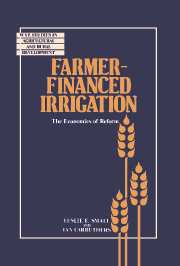Part III - Financial autonomy and user fees: key implementation issues
Published online by Cambridge University Press: 05 November 2011
Summary
In Part II we examined the prospects for irrigation financing policies to achieve desired results relative to the five criteria of encouraging cost-effective operation and maintenance, encouraging efficient use of water, improving investment decisions, promoting efficiency in the mobilisation of resources, and promoting equity. We emphasised the key role that financial autonomy plays relative to most of these criteria.
We now turn to an examination of a number of specific policy issues associated with irrigation financing within the context of financial autonomy. We begin in Chapter 9 by considering requirements for and approaches to the establishment of financial autonomy, noting in particular the important role that user fees must play. This is followed by two chapters that focus specifically on user fees.
Implementing a system of user fees requires the establishment of the actual level of fees. Conflicting forces are encountered in this area. On the one hand, fees need to be high enough to allow the irrigation agency to perform satisfactorily the tasks of operation and maintenance. But it is unrealistic to set irrigation fees without reference to the benefits that the farmers receive. Reconciling these potentially conflicting considerations is examined in Chapter 10.
Enforcement is another difficult area that must be considered in the implementation of user fees for irrigation. If fees are assessed but cannot be collected, the system will not work. These enforcement issues are the topic of Chapter 11.
- Type
- Chapter
- Information
- Farmer-Financed IrrigationThe Economics of Reform, pp. 138Publisher: Cambridge University PressPrint publication year: 1991

